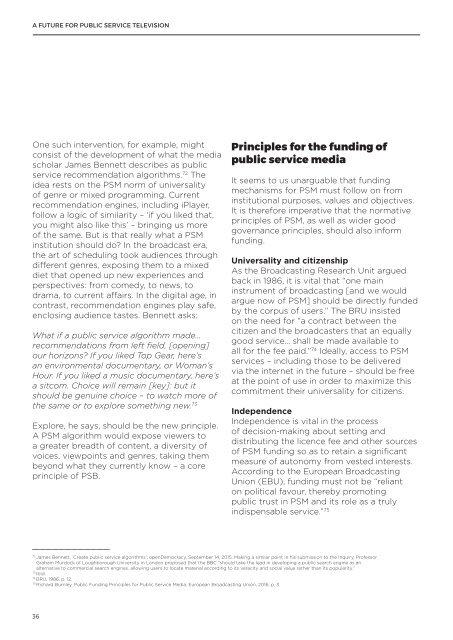A FUTURE FOR PUBLIC SERVICE TELEVISION CONTENT AND PLATFORMS IN A DIGITAL WORLD
FOTV-Report-Online-SP
FOTV-Report-Online-SP
Create successful ePaper yourself
Turn your PDF publications into a flip-book with our unique Google optimized e-Paper software.
A <strong>FUTURE</strong> <strong>FOR</strong> <strong>PUBLIC</strong> <strong>SERVICE</strong> <strong>TELEVISION</strong><br />
One such intervention, for example, might<br />
consist of the development of what the media<br />
scholar James Bennett describes as public<br />
service recommendation algorithms. 72 The<br />
idea rests on the PSM norm of universality<br />
of genre or mixed programming. Current<br />
recommendation engines, including iPlayer,<br />
follow a logic of similarity – ‘if you liked that,<br />
you might also like this’ – bringing us more<br />
of the same. But is that really what a PSM<br />
institution should do? In the broadcast era,<br />
the art of scheduling took audiences through<br />
different genres, exposing them to a mixed<br />
diet that opened up new experiences and<br />
perspectives: from comedy, to news, to<br />
drama, to current affairs. In the digital age, in<br />
contrast, recommendation engines play safe,<br />
enclosing audience tastes. Bennett asks:<br />
What if a public service algorithm made…<br />
recommendations from left field, [opening]<br />
our horizons? If you liked Top Gear, here’s<br />
an environmental documentary, or Woman’s<br />
Hour. If you liked a music documentary, here’s<br />
a sitcom. Choice will remain [key]: but it<br />
should be genuine choice – to watch more of<br />
the same or to explore something new. 73<br />
Explore, he says, should be the new principle.<br />
A PSM algorithm would expose viewers to<br />
a greater breadth of content, a diversity of<br />
voices, viewpoints and genres, taking them<br />
beyond what they currently know – a core<br />
principle of PSB.<br />
Principles for the funding of<br />
public service media<br />
It seems to us unarguable that funding<br />
mechanisms for PSM must follow on from<br />
institutional purposes, values and objectives.<br />
It is therefore imperative that the normative<br />
principles of PSM, as well as wider good<br />
governance principles, should also inform<br />
funding.<br />
Universality and citizenship<br />
As the Broadcasting Research Unit argued<br />
back in 1986, it is vital that “one main<br />
instrument of broadcasting [and we would<br />
argue now of PSM] should be directly funded<br />
by the corpus of users.” The BRU insisted<br />
on the need for “a contract between the<br />
citizen and the broadcasters that an equally<br />
good service… shall be made available to<br />
all for the fee paid.” 74 Ideally, access to PSM<br />
services – including those to be delivered<br />
via the internet in the future – should be free<br />
at the point of use in order to maximize this<br />
commitment their universality for citizens.<br />
Independence<br />
Independence is vital in the process<br />
of decision-making about setting and<br />
distributing the licence fee and other sources<br />
of PSM funding so as to retain a significant<br />
measure of autonomy from vested interests.<br />
According to the European Broadcasting<br />
Union (EBU), funding must not be “reliant<br />
on political favour, thereby promoting<br />
public trust in PSM and its role as a truly<br />
indispensable service.” 75<br />
72<br />
James Bennett, ‘Create public service algorithms’, openDemocracy, September 14, 2015. Making a similar point in his submission to the Inquiry, Professor<br />
Graham Murdock of Loughborough University in London proposed that the BBC “should take the lead in developing a public search engine as an<br />
alternative to commercial search engines, allowing users to locate material according to its veracity and social value rather than its popularity.”<br />
73<br />
Ibid.<br />
74<br />
BRU, 1986, p. 12.<br />
75<br />
Richard Burnley, Public Funding Principles for Public Service Media, European Broadcasting Union, 2016, p. 3.<br />
36


